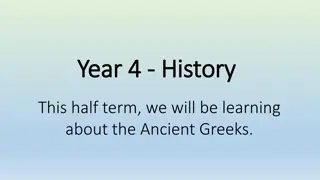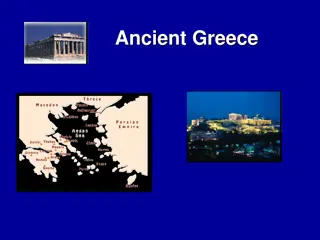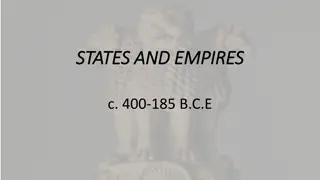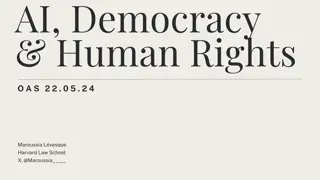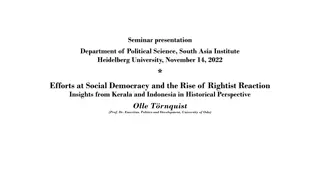Emergence of Democracy: Factors and Evolution in Ancient Greece
Democracy in ancient Greece did not just appear suddenly but evolved over time due to various factors. Oppositional class/power blocks, development of trade routes, intellectual revolution in the 6th century BC, and early democratic behaviors in cities like Dreros, Crete and Chios played crucial roles in shaping the democratic ideals of the era.
Download Presentation

Please find below an Image/Link to download the presentation.
The content on the website is provided AS IS for your information and personal use only. It may not be sold, licensed, or shared on other websites without obtaining consent from the author. Download presentation by click this link. If you encounter any issues during the download, it is possible that the publisher has removed the file from their server.
E N D
Presentation Transcript
Democracy and Imperialism Term 1: Week 1 Prof Michael Scott m.c.scott@warwick.ac.uk
Democracy did not just drop from the sky in the late 6thcentury BC Nor was it an obviously inevitable consequence of events Nor did it come into being in its final form. But there were important factors that contributed to the potential for its emergence
The development of oppositional class/power blocks: Homer s Iliad: a hierarchical system but with examples of people who do speak up / rebel against authority Hesiod Works and Days (c. 700 BC) a system of Kingship despised (?) but with few options on offer e.g. powerless before the bribe-swallowing basileus 38-9. First use of the word tyrant c. 700 BC Theognis of Megara (6thcentury) an aristocrat reacting to social and political revolution; hints of a class approach with rivaling power blocks, particularly demos v. oligoi Increasing resentment of nouveau riche classes
The development of trade and independent routes to wealth not tied to land ownership 8thcentury: rise of polis but also rise of process of colonisation . 7thcentury: massive increase in trade networks 6thcentury: coinage spreading out from Ephesos (first attested 560 BC). The development of larger armed forces (hoplites) rather than reliance of smaller cavalry forces means the community s reliance on a larger number of less wealthy (though still wealthy) people e.g. Lelantine War late 8th century BC
This contributed to what has been termed the 6th century intellectual revolution (Vernant) Development of rational modes of thinking human and naturalistic rather than purely mythological and divine explanations, enquiries into the past, rise in interest in the world of man cf. Thales of Miletus and Xenophon of Colophon Development of concept of politics as ta politika (the affairs of the polis) as an expression of human rational political self-empowerment Development of tragedy and drama in Athens
Earliest evidence for democratic behaviour: Dreros, Crete late 7thcentury: it pleased the polis Chios c. 550 BC boule demosie The Peoples council (alongside an aristocratic council?) Sparta late 7thcentury the Great Rhetra associated with law-giver Lycurgus/ dictated by Delphi cratos for the demos Megara late 7th century, Theaganes established himself as tyrant ruler having slaughtered the cattle of the rich to win over the poor of the city to support him (Aristotle Politics V,4,5) Foundation of Cyrene, Africa late 7th century (republished 4thcentury). Note power of the people
ATHENS: Kingship comes to and end 683 BC position of archon created. Acropolis in 7th century: no temple till after 650 BC. But full of dedications by aristocrats: tripods, wooden chests, griffins, small treasury buildings, marble inscribed plaques 632 BC: Attempted coup by Kylon: attempted to take control of Athens with help of Megara (supposedly given advice by Delphic oracle). Herodotus 5.71: they took refuge in temple on Acropolis. Cylon escaped, but his followers were convinced by 9 archons to leave, were tried and stoned to death. Led to exile of Alcmaeonid family because they were polluted (miasma) with the killing. Late 7th century: the laws of Draco (Draconian!) republished 5th century.
KEY QUESTIONS What are the key elements to look for when trying to pinpoint the emergence of democracy in the ancient Greek world? To what extent was Athens any different in the 7th century from other Greek poleis? To what extent do you think democracy was the likely outcome of the changing nature of Greek society at this time?
Bibliography Fornara, C. 1977 Archaic Times to the end of the Peloponnesian War (Key inscriptions) Robinson, E. W. 2004 Ancient Greek Democracy: readings and sources. J. Arnason et al. 2013 The Greek Polis and the Invention of Democracy K. Raaflaub (et al.) 2007 Origins of Democracy in Ancient Greece P. Cartledge 2009 Ancient Greek Political Thought in Practice C. Farrar 1998 The Origins of Democratic Thinking R. Osborne 1996 Greece in the Making




